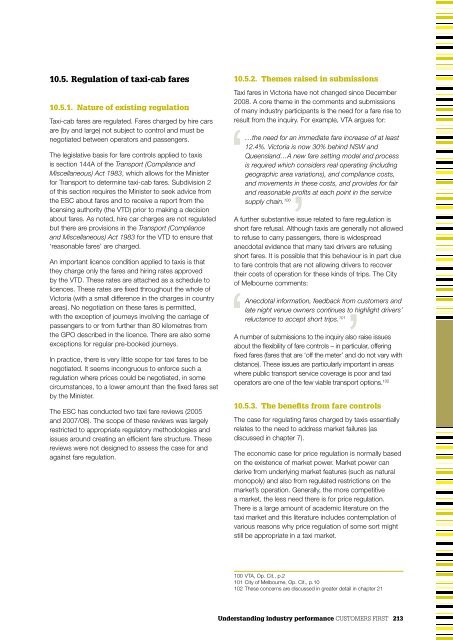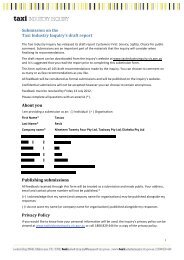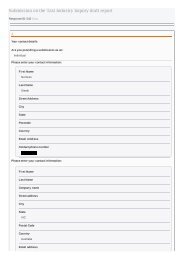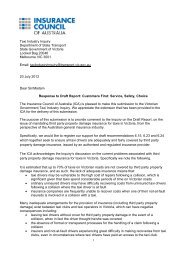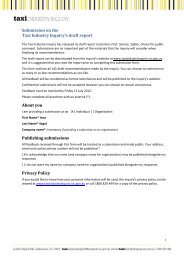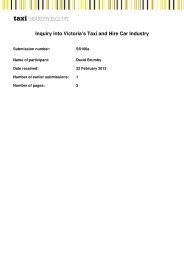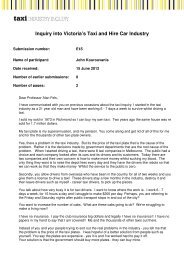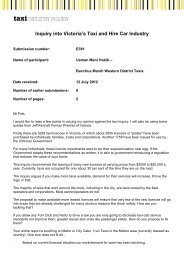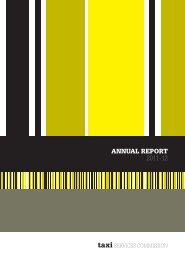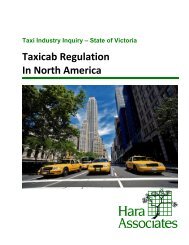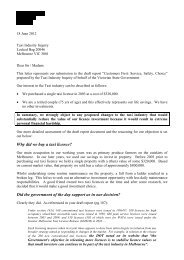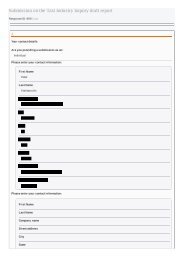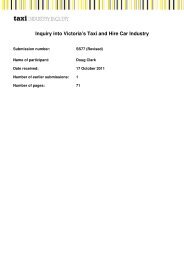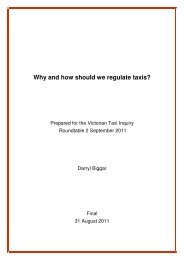Part D â Understanding and improving industry performance (PDF ...
Part D â Understanding and improving industry performance (PDF ...
Part D â Understanding and improving industry performance (PDF ...
Create successful ePaper yourself
Turn your PDF publications into a flip-book with our unique Google optimized e-Paper software.
10.5. Regulation of taxi-cab fares<br />
10.5.1. Nature of existing regulation<br />
Taxi-cab fares are regulated. Fares charged by hire cars<br />
are (by <strong>and</strong> large) not subject to control <strong>and</strong> must be<br />
negotiated between operators <strong>and</strong> passengers.<br />
The legislative basis for fare controls applied to taxis<br />
is section 144A of the Transport (Compliance <strong>and</strong><br />
Miscellaneous) Act 1983, which allows for the Minister<br />
for Transport to determine taxi-cab fares. Subdivision 2<br />
of this section requires the Minister to seek advice from<br />
the ESC about fares <strong>and</strong> to receive a report from the<br />
licensing authority (the VTD) prior to making a decision<br />
about fares. As noted, hire car charges are not regulated<br />
but there are provisions in the Transport (Compliance<br />
<strong>and</strong> Miscellaneous) Act 1983 for the VTD to ensure that<br />
‘reasonable fares’ are charged.<br />
An important licence condition applied to taxis is that<br />
they charge only the fares <strong>and</strong> hiring rates approved<br />
by the VTD. These rates are attached as a schedule to<br />
licences. These rates are fixed throughout the whole of<br />
Victoria (with a small difference in the charges in country<br />
areas). No negotiation on these fares is permitted,<br />
with the exception of journeys involving the carriage of<br />
passengers to or from further than 80 kilometres from<br />
the GPO described in the licence. There are also some<br />
exceptions for regular pre-booked journeys.<br />
In practice, there is very little scope for taxi fares to be<br />
negotiated. It seems incongruous to enforce such a<br />
regulation where prices could be negotiated, in some<br />
circumstances, to a lower amount than the fixed fares set<br />
by the Minister.<br />
The ESC has conducted two taxi fare reviews (2005<br />
<strong>and</strong> 2007/08). The scope of these reviews was largely<br />
restricted to appropriate regulatory methodologies <strong>and</strong><br />
issues around creating an efficient fare structure. These<br />
reviews were not designed to assess the case for <strong>and</strong><br />
against fare regulation.<br />
10.5.2. Themes raised in submissions<br />
Taxi fares in Victoria have not changed since December<br />
2008. A core theme in the comments <strong>and</strong> submissions<br />
of many <strong>industry</strong> participants is the need for a fare rise to<br />
result from the inquiry. For example, VTA argues for:<br />
…the need for an immediate fare increase of at least<br />
12.4%. Victoria is now 30% behind NSW <strong>and</strong><br />
Queensl<strong>and</strong>…A new fare setting model <strong>and</strong> process<br />
is required which considers real operating (including<br />
geographic area variations), <strong>and</strong> compliance costs,<br />
<strong>and</strong> movements in these costs, <strong>and</strong> provides for fair<br />
<strong>and</strong> reasonable profits at each point in the service<br />
supply chain. 100<br />
A further substantive issue related to fare regulation is<br />
short fare refusal. Although taxis are generally not allowed<br />
to refuse to carry passengers, there is widespread<br />
anecdotal evidence that many taxi drivers are refusing<br />
short fares. It is possible that this behaviour is in part due<br />
to fare controls that are not allowing drivers to recover<br />
their costs of operation for these kinds of trips. The City<br />
of Melbourne comments:<br />
Anecdotal information, feedback from customers <strong>and</strong><br />
late night venue owners continues to highlight drivers’<br />
reluctance to accept short trips. 101<br />
A number of submissions to the inquiry also raise issues<br />
about the flexibility of fare controls – in particular, offering<br />
fixed fares (fares that are ‘off the meter’ <strong>and</strong> do not vary with<br />
distance). These issues are particularly important in areas<br />
where public transport service coverage is poor <strong>and</strong> taxi<br />
operators are one of the few viable transport options. 102<br />
10.5.3. The benefits from fare controls<br />
The case for regulating fares charged by taxis essentially<br />
relates to the need to address market failures (as<br />
discussed in chapter 7).<br />
The economic case for price regulation is normally based<br />
on the existence of market power. Market power can<br />
derive from underlying market features (such as natural<br />
monopoly) <strong>and</strong> also from regulated restrictions on the<br />
market’s operation. Generally, the more competitive<br />
a market, the less need there is for price regulation.<br />
There is a large amount of academic literature on the<br />
taxi market <strong>and</strong> this literature includes contemplation of<br />
various reasons why price regulation of some sort might<br />
still be appropriate in a taxi market.<br />
100 VTA, Op. Cit., p.2<br />
101 City of Melbourne, Op. Cit., p.10<br />
102 These concerns are discussed in greater detail in chapter 21<br />
<strong>Underst<strong>and</strong>ing</strong> <strong>industry</strong> <strong>performance</strong> CUSTOMERS FIRST 213


